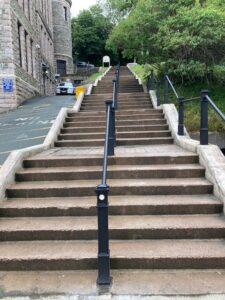The Mayor of Cummings Street
August 2021
The history of a place is the history of the people who live there. This is the history of St John’s over the last 100 years, told through the life of John Browne, known as Jack to his friends.
He was born on April 29, 1923, in a house, long gone, on the corner of Granny Bates Hill and Duckworth Street. His father. also named John, was a clerk at the Royal Stores, a Water Street department store and part of a business network owned by the Macpherson and Job families. Salaries were not high, and the Brownes were renters, living at one time or another on Pennywell Road near the intersection with Cookstown, on Duckworth Street where Caine’s store is now, and other places as well. Young Browne lived with his parents and three sisters.
Jack attended St Pat’s, educated by Christian Brothers. His father was an avid reader, though his taste in books was of a strongly Catholic bent. Jack was well liked by schoolmates and teachers, though prone to minor mischief like pipping off to go to the movies at the Star, the Paramount, the Majestic, or one of the many other theatres of the era. He sang in the choir (though he was too shy to sing solo), and played soccer. He loved firetrucks, and when he lived on Duckworth Street, would run to the former East End fire station on the corner of Ordnance Street at the sound of the bells. On one occasion, a firefighter lifted him onto the truck by the scruff of the neck and he rode to the blaze on the engine.
On April 5, 1932, despite having been warned to the contrary, he climbed out a window and made his way to see the infamous riot at the Colonial building.
Browne loved the Regatta, and claimed to have attended 89 times. He even rowed once for the Royal Stores, during World War Two. He loved to regale people with stories of the greasy pole, drunks trying to swim the pond, the Newfoundland Constabulary’s improvised drunk tank (a tent where they would throw the inebriated to sleep it off until they sobered up), and the highlight of the day, the greased pig that would be released into the crowd to be claimed by whomever was most able to catch and keep hold of the animal.
Talking about life during the Depression could bring a tear to his eyes. He spoke about evicted families out on the sidewalks with all their worldly possessions piled up and no place to go, houses so rotten you could see inside through the gaps, and about Pierce Power and the marches of the unemployed. Browne told the story of taking a hobble delivering flyers to get Christmas money. After hours in the cold, without proper winter clothes, he and his companion threw the remaining bundles over the Battery down into the harbour.
Browne often told the story of how a busybody neighbor came to the door of their house to say she had heard young Jack cursing in the street. His father took him aside and insisted he tell the truth. Browne told him he had not cursed, which was true, and his father sent the woman off with a scolding. It was one of his proudest moments: his father had taken his word over an adult’s.
But life took a hard turn when Jack was in his teens. His mother Norah and father both died within a year or so of each other in 1940. That was the end of formal schooling for him, at 16 he had to go to work to support his sisters.
He started as an assistant in customs clearance for the Royal Stores, but he later became the principal salesman in the men’s suits department, and then a buyer, sometimes travelling to Montreal. People who remember describe him as being the best-dressed and most well-mannered man in the neighbourhood. But the class gulf was very wide. Browne told me about going to ask for a raise on one occasion. He made an appointment and when he went into the upstairs office, Mr Campbell Macpherson sat behind the desk and read the newspaper for 20 minutes without acknowledging him, in an attempt to intimidate him. Browne would not be cowed, waited him out, and walked out with his raise.
He had to go through a similar process, threatening to quit this time, in order to obtain a loan for the mortgage on his little house on Cummings Street, which he needed by now, having a wife, Jean, who he had met through work, and a daughter, Susan. (The loan for the mortgage would have been standard procedure for any member of the working class at that time, bank loans being out of reach.)
Religious prejudice was also very real in the St John’s of those days. Despite his work ethic and sales record, being a Catholic meant he was often passed over for any significant promotion. On one occasion, a Protestant colleague who got a position they had both applied for, went to management to say Browne should have gotten the position instead. Browne, who was not meant to be in earshot, clearly heard his friend being told, “Jack Browne has gone as far as he is going to go in this business.” According to Browne, many Catholics preferred to work for the city’s Jewish merchants such as the Fermans, Wilanskys or Solomons, who did not hold such prejudices.

Then there was the time he chased a man who had stolen a pair of pants from the store. He pursued him from Water Street, up the Courthouse steps, and the steps by the LSPU hall, onto Gower Street. He had managed to get hold of one leg of the pants when he looked at the fellow and decided the store could stand the loss and let him go.
With the opening of the Avalon and Village Malls in the 1960s and 1970s, downtown retail began to decline. Browne could see the writing on the wall, and in 1977, when the opportunity arose, he took a job at the liquor store on Kenmount Road in order to build up a pension. Only three weeks after he left, the Royal Stores closed for good, and many of his former colleagues swore he had inside information.
After his wife died and his daughter moved to Grand Falls, he lived alone in his little house for many years. Always sociable, he had many friends and enjoyed his retirement. The house had no land and was so tiny he used the trunk of his car to store things like his tools and his lawn chairs.
When he was well into his 80s, his daughter moved back to her childhood home, where she lived the rest of her life. Browne enjoyed music, a drink or two of rye whiskey, and sitting out on the street in his chair on sunny days, having a yarn with passers-by. He was known as the Mayor of Cummings Street. He enjoyed talking to tourists and was known to conduct his own spontaneous little tours of the city he loved so well. He could have people over and stay up ‘til three in the morning well into his 90s, and continued to be known as a kind and generous man. He seemed ageless, and things were fine, until they weren’t. Both he and Susan fell ill in the late summer of 2018, and died within a few days of each other in February the next winter.
Browne had the spirit of this city running through his veins.
Katie Vatour is an illustrator, writer, and poet whose collection An Unorthodox Guide to Wildlife was recently published by Breakwater Books.



